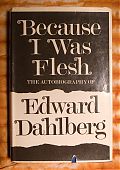
Edward Dahlberg
Because I Was Flesh
If there is one thing I know of Edward Dahlberg, it is that not many people know of him. Neither had I. His name was dropped in a kind email from a reader, sparking my curiosity: Who is Edward Dahlberg? A writer teetering on the edge of a sheer drop, gone or nearly gone, smote from even forgotten American writer’s lists.
Because I Was Flesh is the most well-known and easiest attainable of Edward Dahlberg’s works and so Because I Was Flesh was what I read. Though it may be Edward Dahlberg’s autobiography, it is less the story about the writer’s youth to adulthood and more a novel about his mother, Lizzie Dalberg. An immigrant from Poland at a young age, nearly without family, a hopefully determined and chronically unlucky lady.
My mother and I were luckless souls. She strove fiercely for her angels and was wretched most of her days in the earth. Moreover, if she failed, who hasn’t?
Because I Was Flesh reads like Greek, or the Bible. It is perhaps one of the most anciently poetical American books that I have read. Which makes sense, considering that those were the sweet young days of the USA and of Kansas City. How youthful our American cities were then, cradled by wild plains and the unexplored.
Lizzie found herself in Kansas City after a rough American tour mapped by money and men. With a young child, she was in need of both. Eventually finding her calling cutting men’s hair, she saved enough capital to open the Star Lady Barbershop. Always on the lookout for a husband, some company on lonely nights, somebody to help raise up her son and herself, into relationships she went, then back out.
It was rather disheartening to read of all these failed trials and lousy men who came empty handed from the start. And it also must be assumed that being Lizzie must have been as equally, if not more, disheartening. Yet in her own way she had hope and always managed to cheer herself up. Never depressed nor discouraged, Lizzie stayed busy getting by.
Some doom hovered uneasily over her; how quickly the bad angels, who carry misfortune in their pinions, succeed the bearers of felicitous news. Nobody can endure his own happiness; besides, what weakens human character so much as long spasms of agreeable events?
And though I said that the trials of Lizzie’s life were disheartening, Because I Was Flesh was not. It was with some kind of reverential humor that Edward Dahlberg has written about his mother, a whole book of asking for her forgiveness, for himself and for the elements that had conspired against her. Yet it all wasn’t roses for Edward either. By some mischance, one of Lizzie’s suitors convinced her to send her son to an orphanage, in Cleveland, for six years.
Though his stay in the orphanage consumes a mere chapter (if this was John Cowper Powys’ story it would have went on in the hundreds), it signifies a period of transformation. In the chapter following Edward’s release (or graduation) he has begun to write of himself in first person. Similar to Joyce’s stylistic progression, the author is now in possession of self-knowledge, instead of only that knowledge of self derived from the streets, towns, stables and rivers. Now Edward’s growth parallels Lizzie’s aging decline.
Lizzie is one of those women who deny that death and old age can happen to them. Fleeing the inevitable she still searches out husbands in the single’s columns. It is not that much of a surprise that with Lizzie’s death this book ends. To explain the occasional tones of apology we read that Lizzie died alone. Which is deeply tragic, more tragic than her lack of money despite endless hard work, more than the thieving men, her son could not face her.
I had not the strength to handle her tragedy, for my will has failed me every hour of each day.
But Edward Dahlberg did have the strength, for he wrote this poignantly truthful yet tender book. He worked up the ghosts of his mother then wrote her, staring down towards the ends of her soul for years. And that is why this book is good–not only because of the beautiful writing—but Because I Was Flesh speaks human, written with flesh.
→ Further reading on Edward Dahlberg by Fanny Howe.
· · · · · · · · · · · · · · · · · · · ·